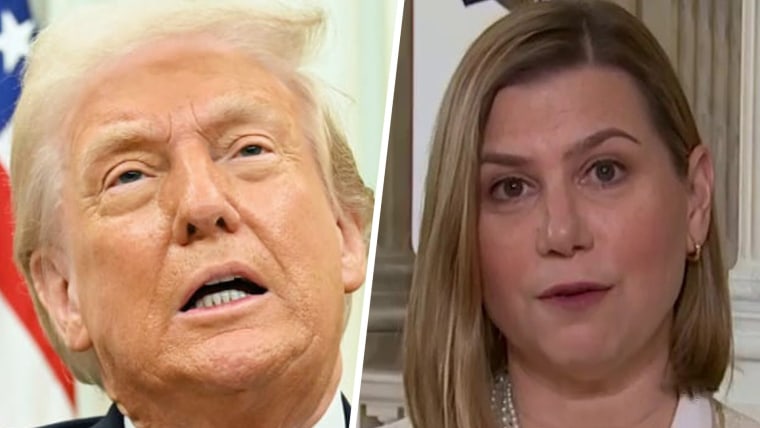Sen. Elissa Slotkin, D-Mich., while recently discussing the Democrats’ brand crisis, told Politico that the party ought to avoid using the term “oligarchy” because it doesn’t resonate outside coastal institutions and suggested that Democrats say “kings” instead. Days later, Sen. Bernie Sanders, I-Vt., who has been drawing massive crowds on his “Fighting Oligarchy” tour, retorted, “I think the American people are not quite as dumb as Ms. Slotkin thinks they are.” He continued, “I think they understand very well. When the top 1% owns more wealth than the bottom 90%, when big money interests are able to control both political parties, they are living in an oligarchy.”
Naturally, a democratic socialist is more inclined than a conservative Rust Belt Democrat to push the idea that America is run by a small group of wealthy elites. But there’s another dimension to the rift over talking about “oligarchy” that’s not as much about politics as it is political communication: Establishment Democrats don’t believe they can persuade the public to adopt new positions and rethink their worldview.
The party knows that it was shellacked and yet has no confidence to pursue reinvention.
Slotkin said so herself. Prompted by a journalist to respond to Sanders’ comment, she said, “I agree with everything he said, other than, my dad didn’t know what oligarchy meant.” In other words, she’s skeptical that the idea of “oligarchy” can even be transmitted to and understood by a mass public. That hesitation to present alternative positions that might sit outside mainstream thinking is shared by many of her colleagues — and it’s key to understanding the party’s crisis, and the country’s crisis.
Look at the way the Democratic Party has largely frozen up and avoided a full-on confrontation with President Donald Trump since the November election. The party knows that it was shellacked and yet has no confidence to pursue reinvention or explain what they’re fighting for. Democratic strategist James Carville’s advice to Dems after that election was to “roll over and play dead.” Senate Minority Leader Chuck Schumer said he was inclined to hang back and let Trump “screw up,” a mindset that has informed his refusal to fight hard in the Senate.

Many Democrats have decided that Trump has won the day on immigration. They have voted with him on the issue and hesitated in pushing back against his extreme deportation agenda, despite him shredding up due process and First Amendment rights. California Gov. Gavin Newsom, a potential 2028 Democratic White House hopeful, seems to be adopting MAGA-friendly positions objecting to “woke culture.” On his podcast, he provided a friendly platform for former Trump campaign manager Steve Bannon to lie about the 2020 election. The party remains stuck in a state of permanent anxiety that preceded their loss — last year President Joe Biden and later Vice President Kamala Harris appeared to fear standing for anything other than defending against Trump.
Democrats have quasi-surrendered to Trump in part because many believe Trump has a finger on the pulse of the body politic on issues such as immigration and believe that their pushing back will backfire. But there’s also an absence of faith that the party can embark upon persuading the public to see things in a way that isn’t defined by the right or isn’t a reversion to a pre-Trumpian status quo. Slotkin’s preference for “kings” is a poignant example because, while she’s obviously right that the word is more recognizable, she’s taking a position against pursuing a positive new identity and theory of class antagonism that “oligarchy” portends.
If there ever was a time for Democrats to experiment with new ideas to adapt to our populist era, now’s that time. Trump won the popular vote and increased his share of support in over 90% of counties across the U.S., compared to 2020, and the Democratic Party is experiencing record-breaking levels of unpopularity. Democrats also have significant room to experiment with messaging and policy as a minority party — the next set of elections are still 18 months away. What is there to lose?

Democrats have been unable to think outside narrow status quo-oriented paradigms for decades. President Bill Clinton’s strategy of “triangulation” — co-opting conservative talking points to deflect attacks from the right — has shaped the party’s thinking ever since, and his longtime allies are now saying it’s the way forward even as Trump plunges us into an authoritarian nightmare. An adjacent mistake is Democrats, especially center-left pundits and strategists, promoting “popularism,” the idea that Dems should only align themselves with policies and rhetoric that poll highly at the current moment.
But Democrats are mistaken — and catastrophically so. And not just in their general refusal to call out “oligarchy.” The party needs to stand for something real and worthwhile instead of trying to find a way to contort itself to ride out waves of reaction. Persuasion requires an experimental mindset and a willingness to try new things. It is indeed possible to persuade people to accept radically new beliefs — as Trump has repeatedly proved in the last decade.
Slotkin’s apparent belief that “oligarchy” is a term only intelligible to liberal elites isn’t even right. Data for Progress surveyed likely voters in late February and early March — after Sanders kicked off his tour — and asked them to choose the definition of “oligarchy” from multiple choices describing different forms of government without labels, including oligarchy, autocracy, theocracy and direct democracy. A majority answered correctly and, crucially, were able to correctly distinguish between definitions of oligarchy and autocracy. Not only did 54% of Democrats chose the correct answer, but 68% of independent or third-party voters, and 48% of Republicans did, too. After being given the definition of oligarchy, 60% of likely voters said the U.S. was at least somewhat oligarchic.
Public opinion is never fixed, and political leaders have a huge role to play in shaping the way their party understands issues.
Those results don’t mean that oligarchy is widely understood yet. But they illustrate that the term is legible with context and that it has the potential to gain purchase with the broader public.
Public opinion is never fixed, and political leaders have a huge role to play in shaping the way their party understands issues. “There’s lots of research that shows that political leaders often can have very significant persuasive power over the loyal followers of their party,” David Hopkins, a political scientist at Boston College, told me. “For a lot of people who are partisans, their identity as a partisan is more central to them than their position on most policy issues.” He noted how President Barack Obama’s switch to support of gay marriage triggered “a noticeable jump” in the share of Democrats, especially Black Democrats, who support gay marriage.
In another Data for Progress poll in March, likely voters were initially opposed to Nippon Steel Corporation, a Japanese company, acquiring U.S. Steel. But after seeing supportive messages from their own party regarding the acquisition, Democrats shifted in favor of it by an astonishing 69 points.
Trump illustrates the capacity of a politician to persuade followers to adopt new beliefs. He has transformed his own party’s attitudes toward immigration, free trade, Canada, Europe, the Russia-Ukraine war, Ukrainian President Volodymyr Zelenskyy, and on all kinds of norms of propriety in the public sphere. Trump is anti-intellectual, but he has also brought obscure, abstract concepts into wide circulation, such as the idea of “the deep state.” It is a term that Trump uses deceptively and toward reactionary purposes, but there is a kernel of truth to his point that government bureaucracy personnel can have power and interests that are distinct from and at odds with democratically elected leaders — for better and worse. It’s a theoretical concept, and it doesn’t make oligarchy look like an impossible lift.
Changing the views of your own party, ideally toward good ideas that match the moment and excite people, is in and of itself important in a highly polarized era where turnout is essential to winning electoral contests. But the tougher sell is persuading people outside one’s base. Here, too, Trump showed success. Trump not only changed his own party's positions on issues such as free trade and immigration, he also put Democrats on their back foot on those issues while attracting low-information swing voters looking for a change-coded candidate.
None of this is to say that politicians should gravitate toward unpopular ideas or that they should show indifference to current public interest in policies. The point is that the popularity of a policy or a message is not fixed, and figuring out how a message can resonate is not something that can be worked out purely through guesswork. It involves effective, charismatic politicians testing assumptions and seeing what happens — and not backing off of the moment those new ideas, as so many do, receive backlash. (Consider how Harris immediately distanced herself from her most economically populist-sounding policy in 2024 — cracking down on corporate price gouging — the moment it got fierce pushback from mainstream media and the right.)
“Especially in this moment, voters value their leaders being authentic and fighting for them,” Ryan O’Donnell, deputy executive director at Data for Progress, told me. “Public opinion matters — it’s important to know where voters stand — but popularism risks triangulation and inauthenticity if pinpointing those preferences is all you care about.”
To that point, look at what the huge crowds for Sanders are telling us. Last month the data journalist G. Elliott Morris aggregated three months of YouGov polls asking respondents how favorably they view prominent political figures or possible 2028 candidates, and he determined that Sanders was the most popular political figure in America — and the only one with a significant net favorability rating. Here’s his analysis:
One theory for Sanders’ relative crossover appeal is his emphasis on criticism of the system — something young men in particular shared with him in 2016, and which left them open to the appeal of Trumpism in 2024 (especially post inflation in 2022-2023). Sanders’s campaigning against the neoliberal consensus is persuasive with the many voters (and again, especially young people) that believe has left them behind. Trump was the voice for this cohort in 2024, as Sanders was in the 2016 primary (and to a certain extent in the 2016 general). Maybe Democrats can learn something from that.
There is a growing oligarchy in this country and Democrats not talking about it hasn’t helped them avoid horrific approval ratings. They need to embrace change, not only for their party’s survival, but for the survival of the republic.

